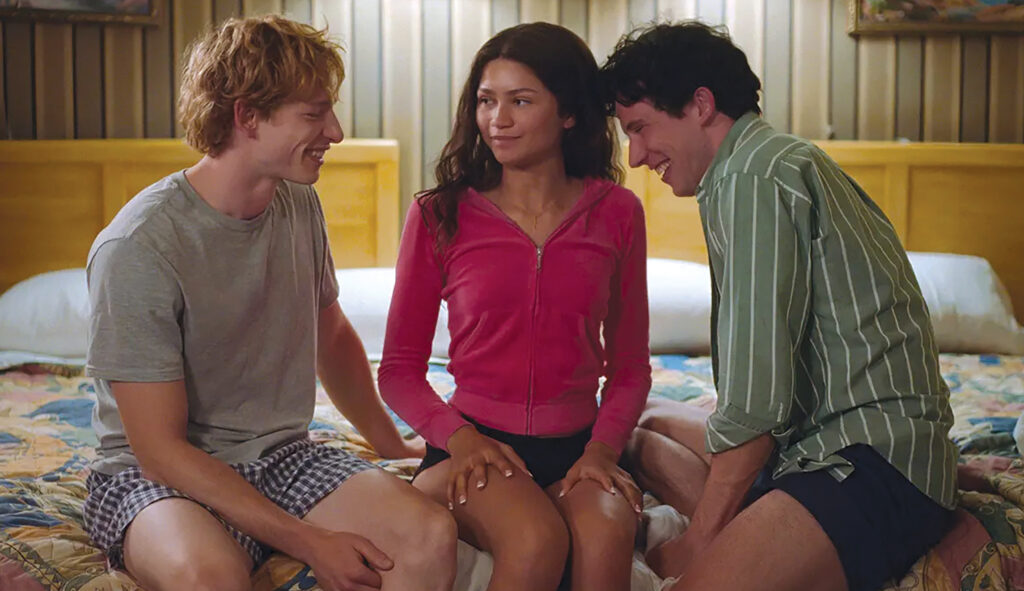
A good tennis movie is hard to find. Match Point (2005), Woody Allen’s smoldering drama of elite manners, was beautifully wrought but preferred the sport’s metaphoric richness to its actual gameplay. Wimbledon, the 2004 Kirsten Dunst rom-com, CGI’d the occasional backhand but was too timid to hoist any trophies. If nothing else, Challengers, the new movie by Italian director Luca Guadagnino, avoids the charge of excessive politesse. A sweaty romp of a film, the picture believes in nothing so conventional as relaxation. Characters perspire and collide, aware that each scrape or embrace could be the one that alters a match, in every sense of that word.
This obsession with bodies is nothing new for Guadagnino, a filmmaker who has long projected upon the human form any number of visions. In Call Me by Your Name (2017), the director’s American breakthrough, male shirtlessness was both symbol and emotional cue: a synecdoche for alpine freedom and a call to illicit romance. Suspiria (2018), which placed a witches’ coven in a West Berlin ballet academy, treated audiences to the most physically gruesome scene in recent memory. Supernaturally manipulated from afar, a Soviet performer dances until her every bone has snapped.

(Courtesy of MGM)
In his latest movie, Guadagnino’s interest is in bodies as vectors for an all-encompassing competitive impulse. It isn’t just that the film’s tennis courts and bedrooms share an ethic of wins and losses. It’s that the two arenas are functionally indistinguishable, providing the film’s protagonists with space to define, and ultimately surrender to, their lusts.
The picture stars Zendaya as Tashi Duncan, a tennis superstar whom injury has relegated to the coach’s box. Tashi’s single client, played by Broadway veteran Mike Faist, is her husband, Art Donaldson, a onetime plodder who has risen to the heights under his wife’s tutelage. As the film begins, Art is one U.S. Open championship away from the Career Grand Slam, a legacy-defining accomplishment that brings to mind such names as Federer and Nadal. Yet Art has lost his swagger in recent months. Perhaps the answer lies in New Rochelle, where a lower-tier tournament promises a confidence-boosting glide to victory.
For the briefest of moments, Challengers seems ready to offer up a traditional sports movie narrative, in which a downtrodden athlete rises to success on the wings of perseverance. Interrupting this story arc is the appearance, on the other side of the New Rochelle net, of The Crown’s Josh O’Connor, an actor far too famous to play a mere ball-and-racket jabroni. O’Connor’s character, juniors-champ-turned-journeyman Patrick Zweig, is all vim and vigor, the cocky yang to Art’s demoralized yin. Complicating matters further is the fact that the two men have known each other since they were teenage rivals. Having battled for both service points and Tashi’s affections, the pair share a history so intricate it can hardly help but spill over onto the court.
It is in the exploration of this checkered past that Challengers spends the bulk of its narrative energy. Whipped from 2019 to 2006, we meet Art and Patrick as youthful frenemies, delighted by their on-court success and eager for a greater conquest with their stunning peer. The Tashi of the mid-aughts is both budding champion and all-around firecracker, demolishing “Sally Country Club” on the court one moment and oozing sexual charisma the next. The ensuing situation, perhaps unsurprisingly, is a love triangle with contemporary angles, as the trio hash out who will sleep with whom. But why choose? Following a night of drinking and flirting, Tashi comes as close as humanly possible to taking both men into her bed at once.
How strange, given the film’s generally fine acting, that the resulting scene has all the eroticism of income-tax paperwork. No, heteroflexibility isn’t my bag, but neither should Guadagnino’s latest parade of flesh be quite so clinical, airless, and dull. Match Point has endured in part because Jonathan Rhys Meyers and Scarlett Johansson had the kind of eyeball-scorching chemistry that would give a nun the sweats. Challengers, by contrast, feels like it was cast over Zoom. Did no one think to put its leads in a room together and check for sparks?
CLICK HERE TO READ MORE FROM THE WASHINGTON EXAMINER
Of course, there is far more to Guadagnino’s new movie than its sex scenes, and adventures in match-fixing, third-wheeling, and on-court striving await the patient viewer. What the film lacks is the easy emotional coherence one could take for granted in the romantic stories of five minutes ago. He’s jealous; she’s in love; the two of them can’t see straight — until they can. The characters in Challengers, with their “throuples” and ostentatious non-judgmentalism, represent a movement that wants to set aside all that. Zendaya may be a wonderful actress, but even she can’t make interesting a woman who has sacrificed normal human desires on the altar of ideology. To put it another way, Tashi’s choices as a character simply don’t, in many instances, make sense.
On a purely technical basis, Challengers will surely be one of the best pictures of the year, a marvel of pacing, cinematic design, and directorial control. Yet, even as the final match unfolded, I found myself cheering against all involved, not a single one of whom deserves the win. The tennis, it should be noted, is spectacular. I just couldn’t understand the game.
Graham Hillard is editor at the James G. Martin Center for Academic Renewal and a Washington Examiner magazine contributing writer.






